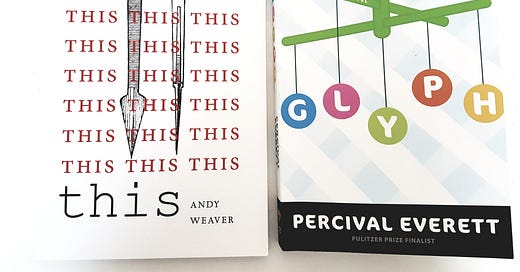Setting out to review Andy Weaver’s 2015 Chaudiere Books release This, while happening to be reading Percival Everett’s 1999 Graywolf Press novel Glyph, it quickly becomes apparent that the experience of reading the one is inextricably bound up with the resonance between the two.
In This, Weaver quotes Jean-Luc Nancy, Jean-François Lyotard, Gertrude Stein, and several others. In Glyph, Everett cites John Searle, Roland Barthes, Friedrich Nietzsche, and Ludwig Wittgenstein, among others. When Everett quotes Nietzsche and Wittgenstein, he invents their dialogue:
WITTGENSTEIN: If I know it solely from my own case, then of course I know only what I call that, not what anyone else does. Make the following experiment: say, “I have a good reputation” and mean, “I have a bad one.” Can you do that? And what are you doing as you do it?
NIETZSCHE: What is the matter with you?
Everett includes a handy diagram explaining semiotics to babies. Also, several diagrams conveying semiotics as explained by a baby. The reader may find these visuals a useful supplement to Weaver’s book.
One of several mathematical expressions included in Glyph: S = k log W (where S is entropy, k is Bolzmann’s constant, and W is a measure of disorder in the system). One mathematical expression included in This:
T H I S
H h i I
≠
A h a H
T H A T(with apologies for inability to perfectly reproduce spacing and layout here).
Some Latin words and phrases used in Glyph: ens realissimum, codex vivus, ephexis. Some Latin-like words used in This: xenadochy, xiphopagi, quodammodotative.
This includes fourteen poems titled “Politics.” Glyph includes six sections titled “libidinal economy” (and a similar number titled “ootheca”, “anfractuous”, “spacing”, “subjective-collective”, and so forth).
Here’s one of my favourite bits from Glyph: “His name was Billy Joe Bob Roy, Colonel Billy Joe Bob Roy, and he was commanding officer of the Division of Exploitation of Potentially and Reportedly Trainable Mentally Exceptional Neophytic Tikes: DEPARTMENT Department of the Pentagon, reporting directly to the Joint Chiefs of Staff and the President of the United States. Colonel Bill Roy wore on his chest all two hundred sixteen Purple Hearts he had been awarded …. The mission of the DEPARTMENT Department was to detect, convert, and exploit any gifted individual, especially children for service to the armed forces of the United States of America.”
And one of my favourite bits from This (if “favourite” is the word I want exactly): “Let’s take this show on the road. How poor is he? / He’s so poor he’s not even properly alienated / from his own labour! Knock-knock! Who’s / there? When is a soccer stadium like a torture / chamber? When is a soccer stadium like a torture / chamber who? Chile, 1973. …”
Glyph is a novel narrated by a baby with an age-inappropriate interest in philosophy of language. This is a book of experimental poetry about, well, “this,” whatever “this” may be. I’d recommend them separately, but I’ll specifically recommend reading both of them together. It’s a pairing of mutual enhancement.
Publication Details
Author: Andy Weaver
Title: This
Publisher: Chaudiere Books
Year: 2015
Publication Details
Author: Percival Everett
Title: Glyph
Publisher: Graywolf Press
Year: 1999




